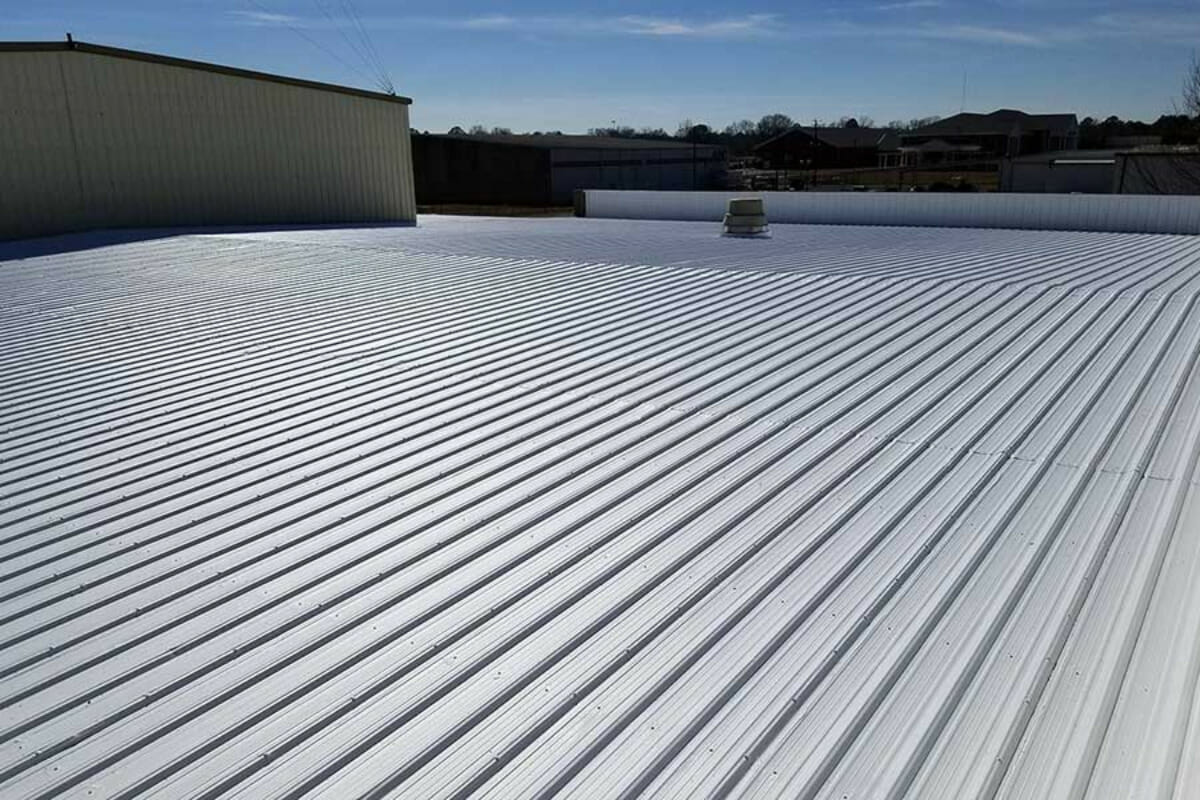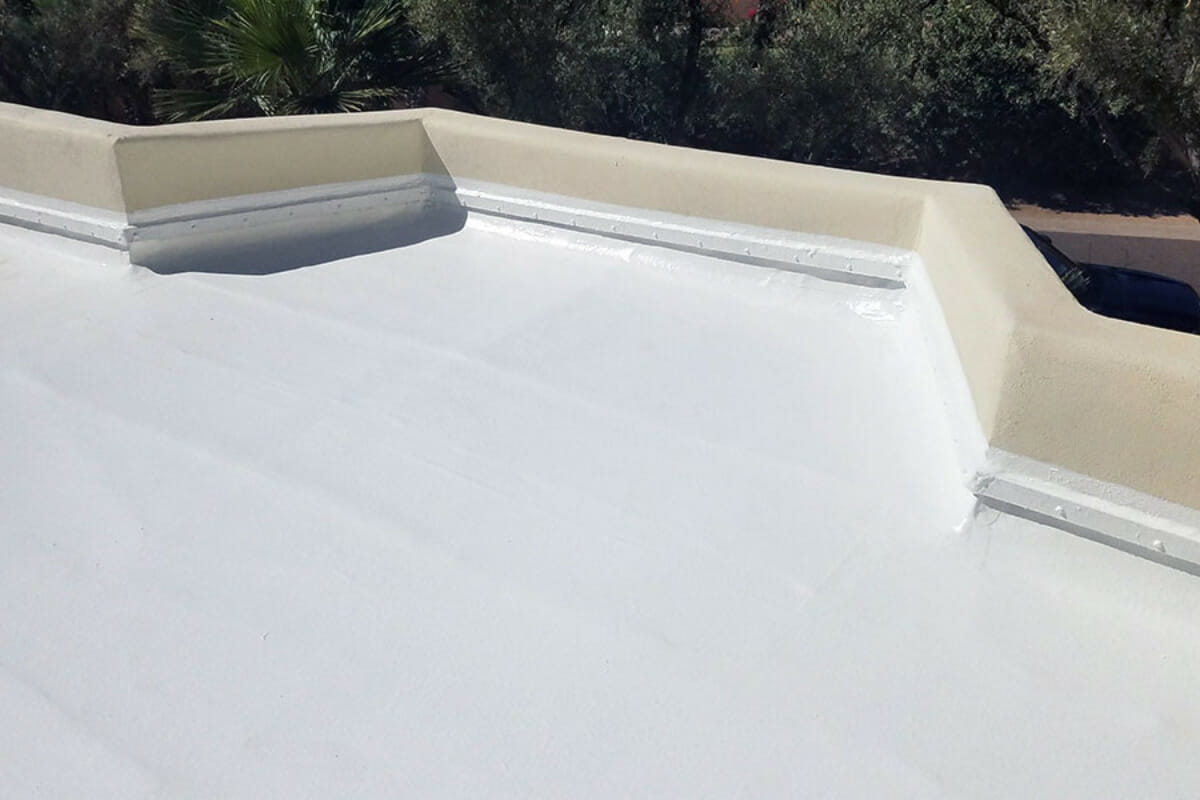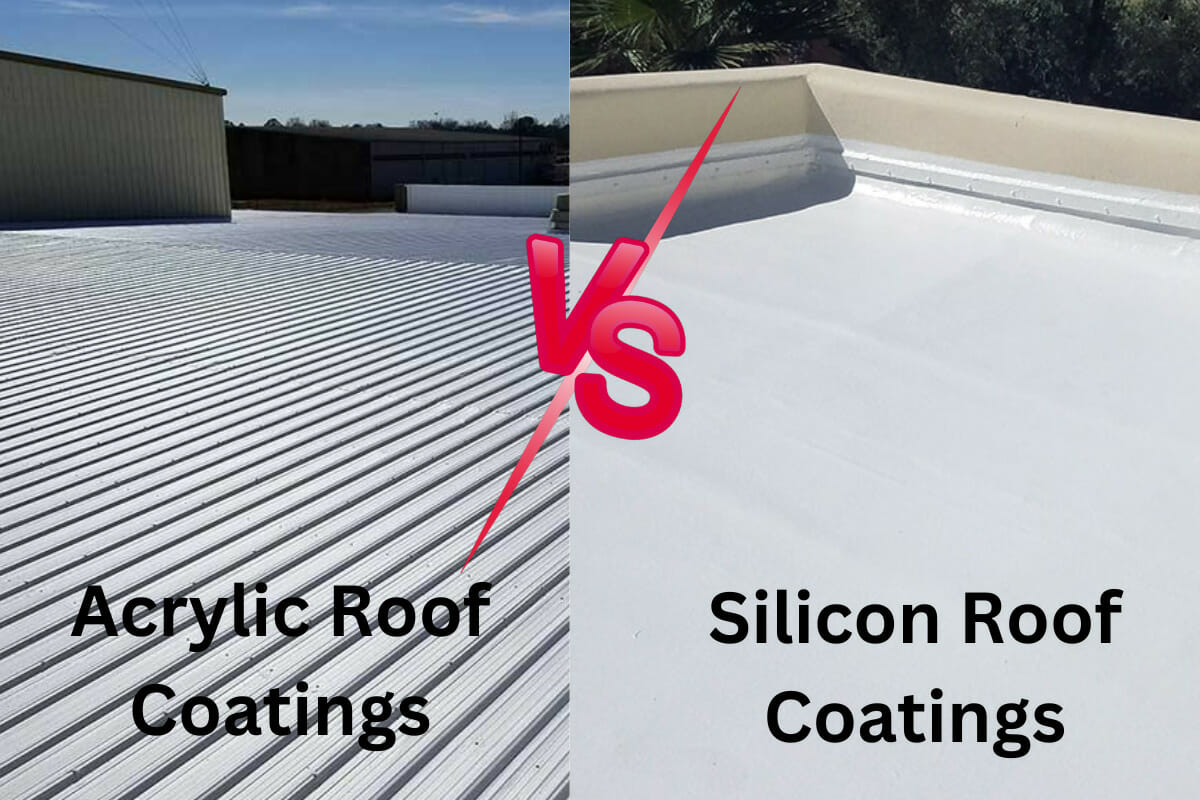If you’re making a purchase, such as which sneaker to buy, and there are two popular options to choose from, making a choice between the two can be a tricky decision.
You may face the same dilemma as a commercial property owner if you have to decide what type of flat roof coating to use on your roof. In the world of commercial roof coatings, two options dominate the market: acrylic and silicone. While both have their merits, making the right choice between these coatings can significantly impact the performance and longevity of your roof.
In this blog post, we’ll break down the differences between acrylic vs. silicone roof coatings, helping you navigate this important decision with ease and confidence. So, let’s dive into the world of roofing and explore which coating suits your specific needs.
What Is An Acrylic Roof Coating?
An acrylic roof coating is a protective roofing material made from a water-based acrylic polymer. It’s a liquid coating that is both rubbery and durable. When the contractor applies an acrylic elastomeric coating to your roof, it forms a sturdy, waterproof layer that shields your building from rain, UV rays, and other harsh weather Think of it as a reliable raincoat for your roof, keeping it dry and safe while also reflecting some of the sun’s heat away to keep your building cool.
Now that you know a little bit about acrylic coatings, let’s look at the other popular option on the market, silicone roof coatings.

What Is A Silicone Roof Coating?
Acrylic roof coatings have been around for quite a while, but over the last few years, silicone roof coatings have also become quite popular. A silicone roof coating is a durable roofing solution that consists of a liquid silicone compound designed to be applied to the surface of existing flat and low-slope roofs, such as those made of metal, single-ply membranes, or modified bitumen.
Once you apply it, the silicone coating forms a seamless, waterproof barrier that provides exceptional protection against the elements, including rain, UV rays, and temperature fluctuations.

Acrylic vs. Silicone Roof Coatings: Points Of Difference
Although you already know that one of the differences between the two coatings is their chemical makeup, it doesn’t end there. In this section, we’ll compare the specific parameters that an owner of a flat roof would want to consider before deciding which roof coating to buy. Below are some of the most essential factors that can affect your decision.
Price
Whether you want to paint your roof or decide to install a new roof itself, the first thing you’ll want to look for is the price of the product. When it comes to cost, you will find that acrylic roof coatings are cheaper than silicone roof coatings. If you’re working with a tight budget, acrylic coatings are more cost-effective upfront, making them a sensible choice for many homeowners.
However, if you want to make a purchase that’s more cost-effective, and limits your need to spend money on repairs and replacements later on down the road, a silicone roof coating may be your better option due to its durability.
Durability
The next important factor after cost in the acrylic vs. silicone roof coating debate is the level of durability.
Though both acrylic and silicone roofing are similar in thickness and strength initially when you consider their effectiveness in the long run, silicone roof coatings easily beat out acrylic in this category.
Why? Because a silicone coating can stay on your roof for much longer than its acrylic counterpart. As you know, the thickness of the coating plays a vital role in determining its overall quality and performance. As the years pass, the effects of weathering and UV rays can cause the coating to degrade, leading to a reduction in its mil thickness.
If you live in an area with harsh weather conditions, such as heavy rainfall or extreme temperatures, silicone may be the better choice due to its exceptional water resistance and longevity.
Also Read: How Long Does A Silicone Roof Coating Last?
Ease Of Application
When it comes to the practical aspect of roof coatings, the simplicity of application is often a significant consideration. Acrylic coatings shine in this department, providing an installation process that not only ensures protection for your roof, but also saves on labor costs.
The ease of applying acrylic coatings can be a game-changer, especially for those looking for a hassle-free experience. Furthermore, the efficient application of acrylic coatings can reduce the overall time required for your roofing project. In fact, this is one of the reasons why acrylic coatings are a cheaper option.
Application Against Ponding Water
Ponding water is a significant concern, particularly for flat roofs. When water accumulates on a flat roof and doesn’t drain properly, it can lead to a range of issues, including structural damage, leaks, and even mold growth.
When it comes to resistance against ponding water, silicone roof coatings beat out acrylic. Acrylic roof coatings, though durable enough, struggle when water sits on it for long periods of time.
Silicone coatings, on the other hand, excel in this department. Their superior water resistance and ability to maintain flexibility over time make them highly effective at preventing leaks, even in areas prone to ponding water. This makes them the go-to choice in rain-prone areas.
UV Reflectivity
UV rays are a constant challenge for roofs, causing deterioration over time. Acrylic roof coatings provide decent UV reflection but may not be as effective as their silicone counterparts. While they do offer protection against UV rays, acrylic coatings can break down more quickly under prolonged exposure to the sun.
On the other hand, silicone products come with impressive UV reflectivity as one of its standout features. Most silicone coating products available on the market come with an impressive solar reflectivity rate of around 70%-80%. Silicone also maintains its integrity over long periods of time, ensuring continual protection for your roof.
Which Roofing Coating Is The Best?
In the end, the choice between an acrylic and silicone roof coating depends on your specific needs and circumstances. Both options offer excellent protection for your roof, but they excel in different areas.
If you’re looking for a cost-effective solution that provides decent weather resistance and energy efficiency, an acrylic roof coating is a solid choice. On the other hand, if you prioritize exceptional water resistance, longevity, and minimal maintenance, a silicone roof coating is worth the investment, especially in regions with challenging weather conditions.
Before making a final decision, it’s always a good idea to consult with a professional roofer who can assess your unique situation and provide expert advice tailored to your needs, as the quality of your roof will play a huge role in the overall condition of the property.
Trust Us For Roof Coating Installation
Regardless of whether you opt for acrylic or silicone roof coatings, what truly matters is having a trusted partner for your roofing needs. At SouthShore Roofing & Exteriors, we’re committed to providing top-notch roofing solutions that stand the test of time.
With years of experience and a team of skilled professionals, we specialize in everything from roof inspections and installations to maintenance and repairs. We’ll provide you with the best commercial roof coating application, and our expert opinion on which coating will benefit your roof. We understand that your roof is a crucial investment, and we’re here to ensure it gets the care and attention it deserves. Contact us today at (813) 400-3329.




